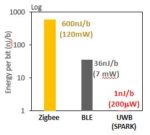This 6-article series started by asking the question: Why did Apple leap ahead of demand in 2019 by designing a UWB transceiver into the iPhone 11? Then in early 2020, why was UWB chip supplier Decawave acquired for an estimated $400-$500 Million? Why are automakers GM, Ford, Toyota, Nissan, Honda, Hyundai, Volkswagen, BMW and … Read More
Author: Frederic Nabki & Dominic Deslandes
The Story of Ultra-Wideband Part 6: The Secret Revealed
The Story of Ultra-WideBand – Part 5: Low power is gold
How can ultra-wideband done right do more with less energy
In the previous part, we discussed how the time-frequency duality can be used to reduce the latency. When you compress in time a wireless transmission, you reduce the time it takes to hop from a transmitter to a receiver. Another very interesting capability enabled by the… Read More
The Story of Ultra-WideBand – Part 4: Short latency is king
How Ultra-wideband aligns with 5G’s premise
In part 3, we discussed the time-frequency duality or how time and bandwidth are interchangeable. If one wants to compress in time a wireless transmission, more frequency bandwidth is needed. This property can be used to increase the accuracy of ranging, as we saw in part 3. Another very… Read More
The Story of Ultra-WideBand – Part 3: The Resurgence
In Part 2, we discussed the second false-start of Ultra-WideBand (UWB) leveraging over-engineered orthogonal frequency-division multiplexing (OFDM) transceivers, launching at the dawn of the great recession and surpassed by a new generation of Wi-Fi transceivers. These circumstances signed the end of the proposed applications… Read More
The Story of Ultra-WideBand – Part 2: The Second Fall
Over-engineered to perfection, outmaneuvered by Wi-Fi
In Part 1 of this series, we recounted the birth of wideband radio at the turn of the 20th century, and how superheterodyne radio killed wideband radios for messaging after 1920. But RADAR kept wideband research alive through World War 2 and the Cold War. Indeed, the story of… Read More
The Story of Ultra-WideBand – Part 1: The Genesis
In the middle of the night of April 14, 1912, the R.M.S. Titanic sent a distress message. It had just hit an iceberg and was sinking. Even though broadcasting an emergency wireless signal is common today, this was cutting edge technology at the turn of the 20th century. This was made possible by the invention of a broadband radio developed… Read More
















TSMC vs Intel Foundry vs Samsung Foundry 2026